We all know about the Holy Family: Jesus, Mary and Joseph. (I hope.)
But there are other holy families too. Millions of families characterised by hidden holiness, including your own. (I hope.) And then there are also a few holy families, which like the Holy Family of Nazareth, are a focus of public veneration and imitation.
For example, there was a family of eleven in fourth century Cappadocia who claim six canonised saints among their number! St Emmelia and St Basil had ten children, including St Theosebia, St Naucratius, St Macrina, St Basil the Great (a Doctor of the Church), St Gregory of Nyssa (another Doctor), and St Peter of Sebasteia.
And then there is the Martin family. Bl Louis Martin and Bl Zélie Martin, like their Cappadocian counterparts, had nine children, one of whom is a Doctor of the Church (St Thérese of Lisieux). Three of their children died as infants, another died at age 5, and the remaining five became consecrated religious. There are efforts underway to beatify St Thérèse’s sisters.
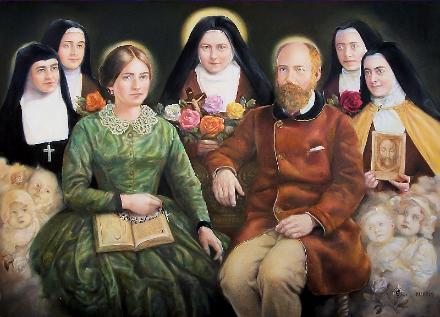
From martinsisters.org
I think there are two important lessons to draw from this. In the first place, the family is the domestic church. This is where character is built and faith is bequeathed. Family life is a natural and fruitful means to holiness!
In the second place, holiness begets holiness. Choose your friends wisely. If you hang around people who strive to love God and their neighbour with their whole being, then you’ll start striving for the same.

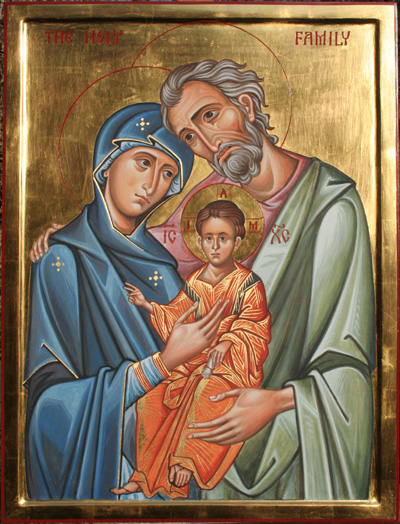
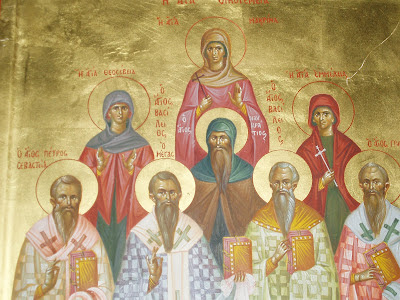
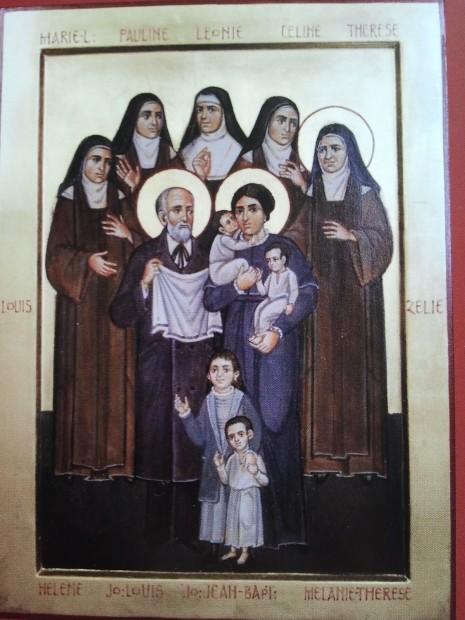
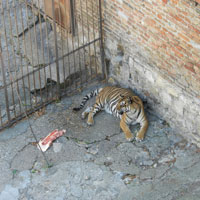

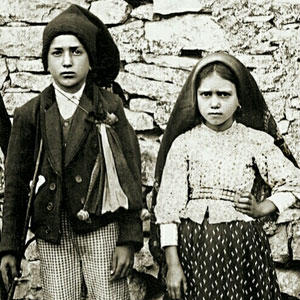
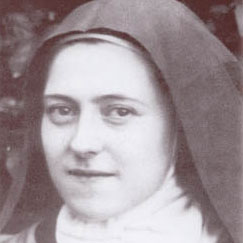
I’m sure there are ‘holy’ families. But I’d like to suggest, Father John, that “The Holy Family’ is a symbol, not a domestic reality.
If you take Incarnation seriously, you smell the sweat and blood and mess of the birth; the scent of semen after intercourse; the smell of excrement in swaddling clothes; you accept that Jesus masturbated as a pubescent teenager; that Jesus got a clip over the ear by ‘Dad’ whenever he chucked a tantrum; that Mary nagged and upbraided Joseph for forgetting to take out the garbage….and so on.
The thing we have to come to grips with, in my view, is that a God that cannot or does not “sin” (or display neurosis or normalcy) is not an incarnate God.
Fact: “Holy Family” is a proper noun – a name for the tableau of Mary-Joseph-Jesus-complete-with-Dove-hovering; it is a religious symbol, not a domestic reality. If Mary and Joseph were real and were married, then they did from time to time what every other couple did – put up with each other!
I think we do not do justice to the Incarnation if we interpret – or present – it in an infantilist mode, unconnected with our own experience.
Much of what Stephen says is true – we shouldn’t remove the Holy Family from the mess of human life, nor do the Scriptures do so – but I draw the line at ‘you accept that Jesus masturbated as a pubescent teenager’.
You have fallen into a common trap of thinking that sin is ‘human’ and sinlessness isn’t, whereas the opposite is true (‘to err is human’): Jesus is more fully and truly human than we are because he doesn’t debase and disfigure his humanity by sinning, not less human.
This isn’t just an arcane bit of point-scoring. The key to a healthy spirituality (which I don’t claim to have yet) is to think of the commandments and virtues not as the arbitrary diktat of a celestial boss, but as the key to our own happiness and fulfillment.
I think your account, Stephen, masquerades as “incarnational,” when it is in fact reductionist. The Incarnation sanctifies and deifies the everyday. It is not the holy that becomes mundane, but the mundane that becomes holy. Moreover, given the historical reality of saints and saintly families, I can’t see how extolling the domestic life of our Lord’s childhood is excessively romantic.
But what I most object to you is your suggestion that “to take the Incarnation seriously” requires rejection of the perpetual virginity of the Blessed Virgin Mary and the well-established claim that Christ is like us in all things but sin. (Heb 4:15) On the contrary, I think it’s quite feasible to appreciate the Incarnation within the parameters of Catholic Tradition!
Thank you so much for this response, Fr. John. I was about to get nasty, but you responded with what I wanted to say in a pastoral, kind, TEMPERED response 🙂 Well done, you! 🙂
Very inspiring Fr John. I hope and pray that many families will try to live holy lives and thus be an example to other families.